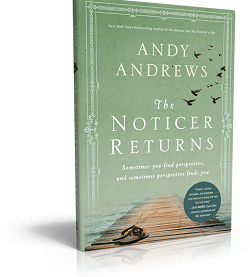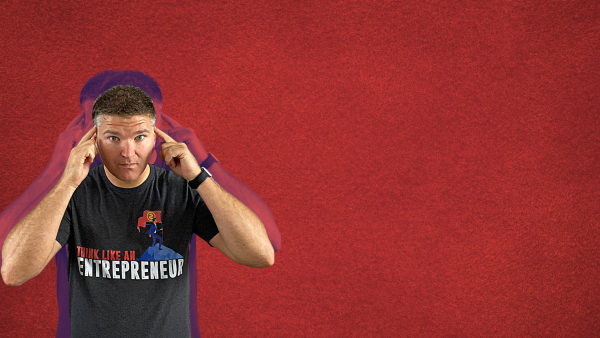Can you fake your way to being a better person? In a word, yes. But how? Authors Andy Andrews and Orson Scott Card might have the answer.
 |
| Lesson from Ender’s Game: Relentless hypocrisy eventually becomes the truth. (Tweet That) | Share this Graphic on Pinterest | Share on Facebook |
Listen to this post:
Change the behavior first
What is a behavior you want to change? Not a feeling or a thought, but a behavior.
Are you too impatient? Too prone to explosive anger? Too timid in the face of threat? Too quiet in meetings? Too selfish?
Again, notice that these are all behaviors, not feelings. They are all outward expressions. Since few people would demonstrate these behaviors intentionally, it’s safe to say that negative behaviors are indicative of inner feelings, though.

Someone relentlessly tapping their fingers on a counter while waiting to checkout is outwardly showing the clerk his inner impatience. When someone violently slams his fist into the same counter, he has clearly shown us that he is angry.
But Andy Andrews reminded me recently in his book The Noticer Returns (pick it up, seriously):
…the old man was attempting to teach me something most people never learn: despite the ebb and flow of our feelings, we can control the way we act. “Patience, for instance,” Jones once remarked, “is not a feeling. Patience is the description of a behavior. One can choose to act patiently even while the feeling of frustration tempts him to choose inappropriate behavior. It is impossible to feel frustrated and feel patient at the same time, but one can be inundated with feelings of frustration and still display patience. Patience is a discipline. Patience is a chosen response.
Can we not all agree that patience is a desirable trait?
So if patience is a desirable trait and you find yourself acting impatient (that is, to show impatient behaviors), would it not benefit you and others around you to fake patience?
Believing the lies
Have you ever heard someone say something like this?
He told the lie so often, he began to believe it.
I caught myself doing that recently. There is a story I often tell about me getting angry on the golf course when I was younger. Now, in this case, the lie I told made me look worse, not better, but it also made for a funnier story.
When I was 17, I was playing poorly in a tournament. I hit yet another bad shot and, in my frustration, threw my umbrella into a lake. It was pouring rain at the time. Not the smartest thing I’ve ever done. My dad was following me and remarked something to the effect of, “well, that was dumb.”
The problem is that it wasn’t raining anymore or at least not hard enough to warrant an umbrella. A friend of mine who also played in that tournament heard me tell the story once and corrected me after nearly 15 years of telling it wrong.
I had told it wrong so many times, I believed it. I don’t know why I started embellishing it. Perhaps it made it funnier as people now imagined me walking the course soaking wet. Whatever the reason, I truly believed it after some time.
Relentless hypocricy
My friend Mark Sieverkropp recently sent me another quote from a book that suggests that you can fake your way to being a better person.
It’s from the second book in the Ender’s Game series by Orson Scott Card. Ender is talking about his brother, who, as a child was always picking on him. His brother even threatened to kill him and Ender is convinced he would have done so if given the chance. But his brother realized that his anger (or more accurately his showing of his anger) would get him nowhere. If he wanted to accomplish his dreams, he had to be more likeable, just like Ender.
His brother grows up to become the leader of the world. At the end of his life, this is what Ender had to say about him:
…he decided that the only way to succeed in his work was to deceive people into thinking he was as lovable as me…So from then on, he looked at all his choices and said, ‘What would a good person do,’ and then he did it. But he has now learned something about human nature. If you spend your whole life pretending to be good, then you are indistinguishable from a good person. Relentless hypocrisy eventually becomes the truth. Peter has made himself a good man, even if he set out on that road for reasons that were far from pure.
In other words, he faked his way to being a better person.
You can, too.
Action item: Choose one undesirable behavior and replace it with a better one. Regardless of your feelings, focus on that one behavior. Don’t try to focus on seven behaviors at once. Just choose one for now.
Have you ever faked your way to being a better person?
Questions?
Text me anytime at (260) 217-4619.
Or…check out some of my free reports to help you get on the right track:
 |
 |
 |
 |
 |
 |
 |
 |
 |








Your post reminds of of the phrase, “Fake it till you make it”.
I’ve faked it as I’ve been learning and soon I wasn’t faking it any longer!
Yes! Eventually it won’t be an effort any longer.
I remember a study from college about training people to use their non-dominant hand to turn a doorknob. Something simple.
For weeks and weeks, up to 10,000 reps, they consciously used their non-dominant hand. Then, they set off a fire. What hand did they use? Their dominant hand.
Another 10,000 reps…same thing. Same result.
Another 8,000 reps…the non-dominant hand took over.
Interesting study.
Very good quotes, story and message! Thanks Matt. And thanks for sharing that quote. As I heard you share it here it actually hit me harder than it did when I first read it!
My Mission President used to always tell us to use the “As If” principle…act as if you are what you want to be.. I found this work over and over again! It’s not being deceiving..it’s just understanding what you want and then working to get there. Thanks for sharing Matt!!